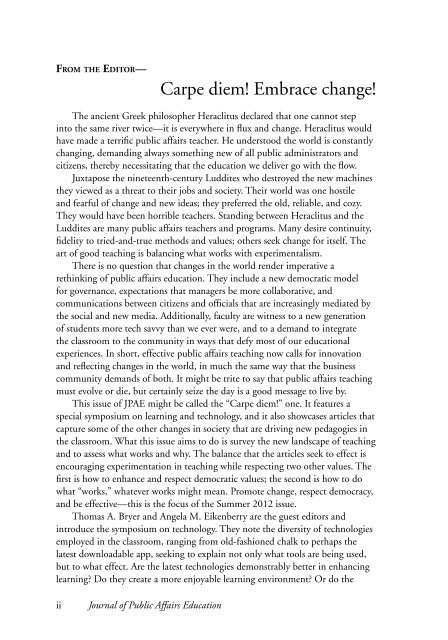summer 2012 - National Association of Schools of Public Affairs and ...
summer 2012 - National Association of Schools of Public Affairs and ...
summer 2012 - National Association of Schools of Public Affairs and ...
You also want an ePaper? Increase the reach of your titles
YUMPU automatically turns print PDFs into web optimized ePapers that Google loves.
From the Editor—<br />
Carpe diem! Embrace change!<br />
The ancient Greek philosopher Heraclitus declared that one cannot step<br />
into the same river twice—it is everywhere in flux <strong>and</strong> change. Heraclitus would<br />
have made a terrific public affairs teacher. He understood the world is constantly<br />
changing, dem<strong>and</strong>ing always something new <strong>of</strong> all public administrators <strong>and</strong><br />
citizens, thereby necessitating that the education we deliver go with the flow.<br />
Juxtapose the nineteenth-century Luddites who destroyed the new machines<br />
they viewed as a threat to their jobs <strong>and</strong> society. Their world was one hostile<br />
<strong>and</strong> fearful <strong>of</strong> change <strong>and</strong> new ideas; they preferred the old, reliable, <strong>and</strong> cozy.<br />
They would have been horrible teachers. St<strong>and</strong>ing between Heraclitus <strong>and</strong> the<br />
Luddites are many public affairs teachers <strong>and</strong> programs. Many desire continuity,<br />
fidelity to tried-<strong>and</strong>-true methods <strong>and</strong> values; others seek change for itself. The<br />
art <strong>of</strong> good teaching is balancing what works with experimentalism.<br />
There is no question that changes in the world render imperative a<br />
rethinking <strong>of</strong> public affairs education. They include a new democratic model<br />
for governance, expectations that managers be more collaborative, <strong>and</strong><br />
communications between citizens <strong>and</strong> <strong>of</strong>ficials that are increasingly mediated by<br />
the social <strong>and</strong> new media. Additionally, faculty are witness to a new generation<br />
<strong>of</strong> students more tech savvy than we ever were, <strong>and</strong> to a dem<strong>and</strong> to integrate<br />
the classroom to the community in ways that defy most <strong>of</strong> our educational<br />
experiences. In short, effective public affairs teaching now calls for innovation<br />
<strong>and</strong> reflecting changes in the world, in much the same way that the business<br />
community dem<strong>and</strong>s <strong>of</strong> both. It might be trite to say that public affairs teaching<br />
must evolve or die, but certainly seize the day is a good message to live by.<br />
This issue <strong>of</strong> JPAE might be called the “Carpe diem!” one. It features a<br />
special symposium on learning <strong>and</strong> technology, <strong>and</strong> it also showcases articles that<br />
capture some <strong>of</strong> the other changes in society that are driving new pedagogies in<br />
the classroom. What this issue aims to do is survey the new l<strong>and</strong>scape <strong>of</strong> teaching<br />
<strong>and</strong> to assess what works <strong>and</strong> why. The balance that the articles seek to effect is<br />
encouraging experimentation in teaching while respecting two other values. The<br />
first is how to enhance <strong>and</strong> respect democratic values; the second is how to do<br />
what “works,” whatever works might mean. Promote change, respect democracy,<br />
<strong>and</strong> be effective—this is the focus <strong>of</strong> the Summer <strong>2012</strong> issue.<br />
Thomas A. Bryer <strong>and</strong> Angela M. Eikenberry are the guest editors <strong>and</strong><br />
introduce the symposium on technology. They note the diversity <strong>of</strong> technologies<br />
employed in the classroom, ranging from old-fashioned chalk to perhaps the<br />
latest downloadable app, seeking to explain not only what tools are being used,<br />
but to what effect. Are the latest technologies demonstrably better in enhancing<br />
learning? Do they create a more enjoyable learning environment? Or do the<br />
ii<br />
Journal <strong>of</strong> <strong>Public</strong> <strong>Affairs</strong> Education

















